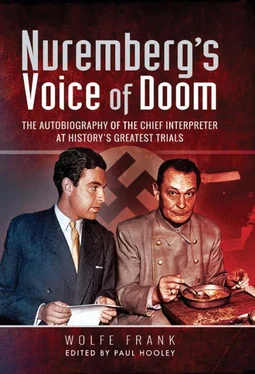Instinctively, I refused to share the optimism of some of my Jewish friends who felt certain that the Nazis would permit anti-Semitism to become a secondary point of their political programme.
A few days earlier I had driven to Stuttgart with a friend of mine who had called on the American Consul for a renewal of his US Immigration Visa. The Consul had looked at my friend’s passport and discovered that a previous visa had been allowed to expire unused. ‘Hell’ said the Consul, ‘you’re a Jew, aren’t you? What are you waiting for?’
My friend declared that he was still hoping that the Nazis would permit the Jews in Germany to live in peace. Handing back my friend’s passport, the Consul said: ‘here’s your visa. Stop being an Opti-Semit. Get out of here!’
I was remembering that conversation as I stood in the crowd on the 5 March. The torchlight procession could be heard approaching in the distance. Then it came into view, headed by a Nazi Brownshirt [5] The Sturmabteilung (SA) – Storm Detatchment – was the parliamentary wing of the Nazi Party. Its members were known as ‘Brownshirts’ because that was the colour of the uniform they wore.
who was bearing the Blood Banner, which had been carried during the unsuccessful Putsch in 1923.
There was the chorus of ‘Heils’ from the crowd and their right arms went up in the Hitler salute.
Before me stood a small middle-aged man dressed in Bavarian clothes. I could only see his back and greying hair, but his whole attitude seemed to be one of consternation. His head was slightly tilted and his shoulders were hunched up. His right arm remained hanging by his side. Suddenly a huge man in a brown shirt, with a swastika badge pinned to his tie, reached over and tapped him on the shoulder. ‘Don’t you give the Salute?’ he asked.
The little man turned and looked at him. ‘I don’t know… What must I do? I mean – should I?’ he stammered.
The big man pushed aside one or two people who were between them. ‘I’ll teach you swine what you have to do,’ he roared and he hit the little man in the face with his fist. Down he went. Then there was a sudden push from behind and people began to trample on him. I saw him pulled up, bleeding and semi-conscious. Not one word was said to the big bully in the brown shirt. No one in that crowd came to the defence of the little man.
The whole incident had only taken a few seconds. I turned away and then I found that I was standing there with my right arm in the air. I was trembling, but at that moment I made two resolutions – I would leave Germany and, come what may, I would never again raise my hand in the Hitler salute.
As for the former, it didn’t happen until four years later, and then only by force of circumstances. However, I managed to carry out the latter, although it entailed many miles of detours to avoid passing Nazi memorials, as well as some really quite unnecessary visits to the toilet of the Carlton Tearoom in Munich, which both Hitler and I frequented for our after-lunch cup of coffee.
Guests at the tearoom were compelled to rise and greet the Fuehrer on entry and exit, while a few of us would make a well-timed and rapid sortie to the door marked ‘Gentlemen’. There were similar excursions each New Year’s Eve when the National Anthem and the Horst Wessel Song [6] The Horst Wessel Song, also known by its opening words, Die Fahne Hoch ( The Flag on High ), was used as the anthem of the Nazi Party from 1930 to 1945.
were played at midnight. The washroom of the Regina Hotel where I usually celebrated the New Year became quite crowded on such occasions.

4. HATRED AND DENIAL
IREMAINED IN GERMANY FOR AS LONG AS I DID because I loved Bavaria – I also had a good many friends who lived there and I loved skiing.
I found a job with the Munich franchise of a car-accessory firm and was given a small car and all of Bavaria as my field of operations. The owner of the firm, Herr Peter, was warned by various people that he was being rather stupid employing a non-Aryan. He was a kind-hearted old man from Saxony and he kept this to himself for quite a while. However eventually I couldn’t help noticing that he had something on his mind. He owned up under questioning and I resigned.
A friend then supplied me with an introduction to one Dr Meyer, Director of the Munich branch of the Adler Works. When I presented myself to him I stressed the fact that I had had a Jewish grandfather. ‘Never mind that’ said Meyer. ‘I propose to go on selling cars to Jews. You can take care of that.’
He assigned a demonstration car to me and for about three months I covered Munich and all of Bavaria without selling a single vehicle. Then Adler delivered the first specimen of a new 1.5 litre car with front wheel drive. I took it out a few evenings later and sold one over a large number of cocktails in the Bar of the Regina Hotel. Taking the customer home afterwards, I skidded and wrecked the only demonstration car we had. I expected to be sacked at once, but wasn’t. Anxious to make up for the disaster, I made a special effort and sold seven cars within the next two weeks. After that my sales increased steadily.
This made my colleagues extremely angry. They called on Meyer – who had by then joined the SS – and they complained bitterly about the non-Aryan salesman’s success. There was a nasty scene when one of them promised me that I would find myself in the Dachau [1] Dachau was the first concentration camp to be opened (in 1933) in Germany. It was located in Bavaria about ten miles northwest of Munich.
concentration camp if I, the Jewish swine, dared to sell just one more car.
The opportunity did not arise, because I was fired.
There then followed some months during which I tried to find a job but couldn’t, before I eventually became an employee of a large garage that sold German and Italian cars and I took over its workshops as manager. The owner, although a member of the Nazi party, did not care about my ancestry. I stayed with him until I left the country in April 1937 in spite of the fact that he was repeatedly attacked for employing me.
Whilst my career, which I had in any case considered to be a very temporary one, was interrupted from time to time by the necessity of having to change jobs, it had produced a fairly satisfactory income. In addition, and this cannot be emphasized enough, I had no difficulties what-so-ever outside the business sphere. My friends remained the same with the exception of two or three Jews who emigrated. Life in Munich, on the surface, was as pleasant as ever. There was sailing on Lake Starnberg during the summer, skiing at Garmisch-Partenkirchen in the winter and there was the October festival with its beer-tents, roasted sides of beef and chicken. During February there was the Munich Carnival, with its studio parties and fancy-dress balls.
However, there were also frequent reminders that, for me at any rate, this delightful state of affairs could not be permanent.
There was the purge of 30 June 1934 when the alleged revolt by Hitler’s Chief-of-Staff, Ernst Röhm, was supressed. [2] ‘The Night of the Long Knives’, also called Operation Hummingbird or, in Germany, the ‘Röhm Putsch’, was a purge that took place in Nazi Germany from 30 June to 2 July 1934, when the Nazi regime carried out a series of political raids intended to consolidate Hitler’s power. Many of those killed were leaders of the Sturmabteilung (SA), or Storm Detachment, the Nazis’ own paramilitary organization, colloquially known as the ‘Brownshirts’ due to the colour of their uniforms. The best-known victim of the purge was Ernst Röhm, the SA’s leader and one of Hitler’s long-time supporters and allies.
Two people I knew died in that: Schneidhuber, the Chief of the Munich police and a music publisher who was unfortunate enough to be called Willi Schmid – a most common name in Germany – his name had been given to a Gestapo squad who picked the wrong Schmid’s address from the telephone book and shot him. The Fuehrer himself heard about it and was ‘Most distressed’. So distressed in fact that he called on Schmid’s widow and ordered a funeral at public expense. I knew Schneidhuber and Schmid only slightly, but their deaths brought a realization of things to come.
Читать дальше













